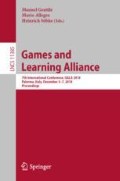Abstract
This working paper investigates the question of changing people mobility towards more sustainable habits involving them in an engaging gameplay. The work is performed within MUV H2020 research and innovation action. The game design, definition and features have been co-created through the involvement of different citizens and stakeholders in six European neighbourhoods. The paper discusses the game design as resulting from co-creation and co-design experiences with each neighbourhood communities involved in initial phases. The paper argues that the local co-design activities have influenced the game definition, together with the community engagement approach. The MUV gameplay approach results thus a demand-side measure able to encouraging people to sustainable mobility modes in the awareness of their potential role as agents of urban livability. The data collected by the players will be used to support a citizen-centric approach to facilitate equity and mobility justice in urban policies.
Access this chapter
Tax calculation will be finalised at checkout
Purchases are for personal use only
Notes
- 1.
TrafficO2 was an action-research project, co-funded in 2012 through the call “Smart Cities and Communities and Social Innovation” promoted by the Italian Education, University and Research Ministry.
References
SUMP Guide. http://www.eltis.org/it/guidelines/sump-guidelines. Accessed 30 Sept 2018
Vanolo, A.: Cities and the politics of gamification. Cities 74(4), 320–326 (2018)
MUV project. https://www.muv2020.eu. Accessed 30 Sept 2018
Suits, B.: The Grasshopper: Games, Life and Utopia. Broadview Press, Peterborough (1978)
Empower. https://empowertoolkit.eu. Accessed 30 Sept 2018
Sweatcoin. https://sweatco.in. Accessed 30 Sept 2018
WeCity. http://www.wecity.it/en/. Accessed 30 Sept 2018
RingRing. https://ring-ring.nu. Accessed 30 Sept 2018
TrafficO2. http://www.traffico2.com/en/. Accessed 30 Sept 2018
Weber, J., Azab, M., Riggs, W., Cherry, C.R.: The convergence of smartphone apps, gamification and competition to increase cycling. Transp. Res. Part F Traffic Psychol. Behav. 56(7), 333–343 (2018)
Nakashima, R., Sato, T., Maruyama, T.: Gamification approach to smartphone-app-based mobility management. Transp. Res. Procedia 25, 2344–2355 (2017)
Di Dio, S.: From Smart to Lean. Altralinea Edizioni, Firenze (2018)
Duhigg, C.: The Power of Habit. Why We Do What We Do and How to Change. Random House Books, London (2013)
Lissandrello, E., Morelli, N., Schillaci, D., Di Dio, S.: Urban innovation through co-design scenarios. In: Knoche, H., Popescu, E., Cartelli, A. (eds.) SLERD 2018 2018. SIST, vol. 95, pp. 110–122. Springer, Cham (2019). https://doi.org/10.1007/978-3-319-92022-1_10
Csikszentmihalyi, M.: Flow: The Psychology of Optimal Experience. Harper & Row Publishers, New York (1990)
Hamari, J., Koivisto, J.: Measuring flow in gamification: dispositional flow scale-2. Comput. Hum. Behav. 40, 133–143 (2014)
Nabatchi, T., Leighninger, M.: Public Participation for 21st Century Democracy. Wiley, Hoboken (2015)
Manzini, E.: Design, When Everybody Designs. MIT Press, Cambridge (2015)
Mcgonigal, J.: Reality Is Broken: Why Games Make Us Better and How They Can Change the World. Penguin Group USA, New York (2011)
Acknowledgments
This research has received funding from the European Union’s Horizon 2020 research and innovation programme, under grant agreement No 723521.
Author information
Authors and Affiliations
Corresponding author
Editor information
Editors and Affiliations
Rights and permissions
Copyright information
© 2019 Springer Nature Switzerland AG
About this paper
Cite this paper
Di Dio, S., Lissandrello, E., Schillaci, D., Caroleo, B., Vesco, A., D’Hespeel, I. (2019). MUV: A Game to Encourage Sustainable Mobility Habits. In: Gentile, M., Allegra, M., Söbke, H. (eds) Games and Learning Alliance. GALA 2018. Lecture Notes in Computer Science(), vol 11385. Springer, Cham. https://doi.org/10.1007/978-3-030-11548-7_6
Download citation
DOI: https://doi.org/10.1007/978-3-030-11548-7_6
Published:
Publisher Name: Springer, Cham
Print ISBN: 978-3-030-11547-0
Online ISBN: 978-3-030-11548-7
eBook Packages: Computer ScienceComputer Science (R0)

